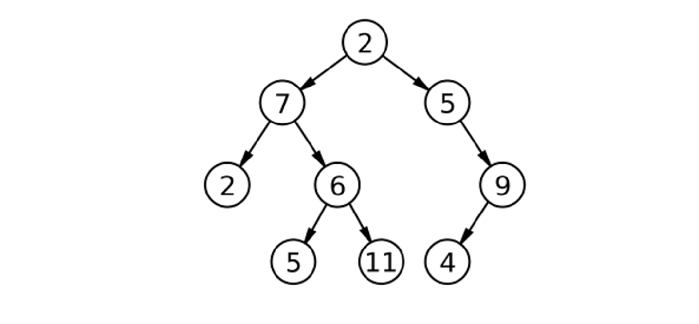使用C++将二叉树中的每个节点替换为其中序前驱和后继的和
给定一棵二叉树,我们需要将所有元素替换为其中序前驱和后继的和。中序遍历是图中一条遍历路径,其读取顺序为左节点 – 根节点 – 右节点。该方法将左节点和右节点的元素相加,并用所得的和替换该值。
假设我们有一棵具有以下结构和字符的树:

我们可以找到并存储树的中序遍历结果到一个数组中。之后,我们可以再次进行中序遍历,但这次我们将用数组中的索引替换元素。
让我们来看一些输入场景:
假设输入为二叉树节点读取值:[3 8 15 7 10 3 6 4 9],则得到的结果二叉树为:
Input: [3 8 15 7 10 3 6 4 9] Result— Before: 3 8 15 7 10 3 6 4 9 After: 8 18 15 25 10 16 7 15 4
假设另一个输入为二叉树节点读取值:[4 6 7 8 5 3 2 7 1],则得到的结果二叉树为:
Input: [4 6 7 8 5 3 2 7 1] Result— Before: 8 6 2 5 7 4 7 1 3 After: 6 10 11 9 9 14 5 10 1
示例
以下是上述方法的C++实现:
#include <iostream> #include <vector> using namespace std; class Node { public: int value; Node *left, *right; Node(int value) { this->value = value; left = right = NULL; } }; void solve(Node* root, vector<int>& arr, int& index) { if(root == NULL) return; solve(root->left, arr, index); index++; root->value = arr[index-1] + arr[index+1]; solve(root->right, arr, index); } void storeInOrder(Node* root, vector<int>& arr) { if(root == NULL) return; storeInOrder(root->left, arr); arr.push_back(root->value); storeInOrder(root->right, arr); } void printInorder(Node* root) { if(root == NULL) return; printInorder(root->left); cout << root->value << " "; printInorder(root->right); } int main() { Node* root = new Node(2); root->left = new Node(7); root->right = new Node(5); root->left->left = new Node(2); root->left->right = new Node(6); root->right->right = new Node(9); root->left->right->left = new Node(5); root->left->right->right = new Node(11); root->right->right->left = new Node(4); cout << "Before: "; printInorder(root); cout << "\n"; vector<int> arr; arr.push_back(0); storeInOrder(root, arr); arr.push_back(0); int index = 0; solve(root, arr, index); cout << "After: "; printInorder(root); return 0; }
输出
Before: 2 7 5 6 11 2 5 4 9 After: 7 7 13 16 8 16 6 14 4
解释
| 节点 | 中序前驱 | 中序后继 | 新值 |
|---|---|---|---|
| 2(根节点) | 11 | 5 | 16 |
| 7(root->left) | 2 | 5 | 7 |
| 5(root->right) | 2 | 4 | 6 |
| 2(root->left->left) | 0(不可用) | 7 | 7 |
| 6(root->left->right) | 5 | 11 | 16 |
| 9(root->right->right) | 4 | 0(不可用) | 4 |
| 5(root->left->right->left) | 7 | 6 | 13 |
| 11(root->left->right->right) | 6 | 2 | 8 |
| 4(root->right->right->left) | 5 | 9 | 14 |
结论
首先存储中序遍历结果,然后依次查找每个元素的中序遍历结果是关键。我们使用索引作为回溯,找出元素插入数组时的位置,然后计算树的新中序遍历结果。我们遍历树和每个节点一次,因此时间复杂度为O(n),我们以中序遍历的形式存储每个元素,因此空间复杂度为O(n)。

广告

 数据结构
数据结构 网络
网络 关系数据库管理系统 (RDBMS)
关系数据库管理系统 (RDBMS) 操作系统
操作系统 Java
Java iOS
iOS HTML
HTML CSS
CSS Android
Android Python
Python C语言编程
C语言编程 C++
C++ C#
C# MongoDB
MongoDB MySQL
MySQL Javascript
Javascript PHP
PHP